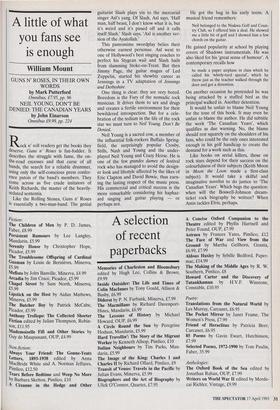A little of what you fans see is enough
William Mount
GUNS N' ROSES, IN THEIR OWN WORDS by Mark Putterford Omnibus, £7.95, pp. 96 NEIL YOUNG, DON'T BE DENIED: THE CANADIAN YEARS by John Einarson Omnibus £9.99, pp. 224 Rock n' roll readers get the books they deserve. Guns n' Roses is fan-fodder. It describes the struggle with fame, the on- the-road excesses and that curse of all bands, the search for a reliable drummer, using only the self-conscious press confer- ence patois of the band's members. They Come across as five crude imitators of Keith Richards, the master of the heavily- sedated sententia.
Like the Rolling Stones, Guns n' Roses is essentially a two-man-band. The genial guitarist Slash plays yin to the mercurial singer Axl's yang. Of Slash, Axl says, 'Half man, half beast, I don't know what it is, but it's weird and it's pissed off and it calls itself Slash.' Slash says, 'Axl is another ver- sion of the Ayatollah.'
This pantomime swordplay belies their otherwise earnest personae. Axl went to one of Hollywood's best singing coaches to perfect his Stygean wail and Slash hails from slamming Stoke-on-Trent. But then Jimmy Page, the guitar magus of Led Zeppelin, started his showbiz career as Jennings in a TV adaptation of Jennings and Derbyshire.
One thing is clear: they are very bored. Boredom is the Fury of the nomadic rock musician. It drives them to sex and drugs and creates a fertile environment for their bewildered introspection. But for a cele- bration of the tedium in the life of the rock star we must turn to Neil Young, Don't Be Denied.
Neil Young is a sacred cow, a member of the influential folk-rockers Buffalo Spring- field, the surprisingly popular Crosby, Stills, Nash and Young and the under- played Neil Young and Crazy Horse. He is one of the few grandes dames of festival rock who has managed to avoid the design- er look and lifestyle affected by the likes of Eric Clapton and David Bowie, thus earn- ing the lasting respect of the music press. His commercial and critical success is the more remarkable considering his haphaz- ard singing and guitar playing - or perhaps not. He got the bug in his early teens. A musical friend remembers: Neil belonged to the Niakwa Golf and Coun- try Club, so I offered him a deal. He showed me a little bit of golf and I showed him a few chords on the guitar.
He gained popularity at school by playing covers of Shadows instrumentals. He was also liked for his 'great sense of humour'. A contemporary recalls how
he made a paper airplane in class which he called his 'whirly-turd special', which he threw just as the teacher walked through the door and got a detention.
On another occasion he pretended he was being attacked by a stuffed bird as the principal walked in. Another detention.
It would be unfair to blame Neil Young for the tone of this book. It may even be unfair to blame the author. He did subtitle the work 'The Canadian Years', which qualifies as due warning. No, the blame should rest squarely on the shoulders of his fans, who could be the only ones interested enough in his golf handicap to create the demand for a work such as this.
Like books on serial killers, those on rock stars depend for their success on the colourfulness of their subjects (Keith Moon in Moon the Loon made a first-class subject). It would take a skilful and imaginative novelist to do justice to 'The Canadian Years'. Which begs the question: when will the Boswell-Johnson dream- ticket rock biography be written? When Amis tackles Elvis, perhaps.


















































 Previous page
Previous page